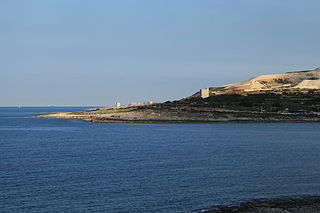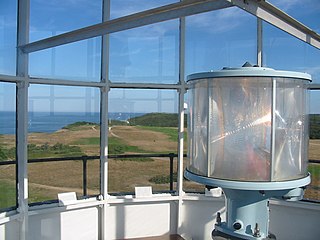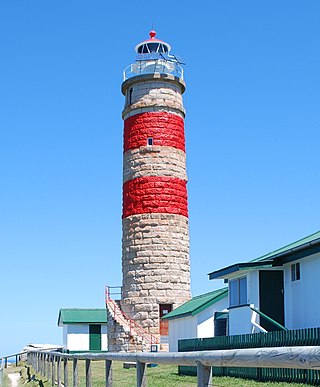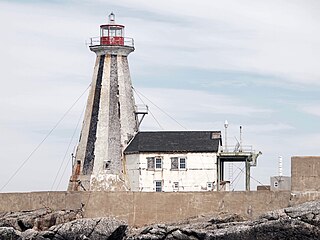
Fort Delimara is a polygonal fort in Marsaxlokk, Malta. It was built between 1876 and 1888 by the British as part of a chain of fortifications intended to protect Marsaxlokk Harbour. Today, the fort is still intact but is in need of restoration, and is in danger of collapse due to coastal erosion.

Cordouan lighthouse is an active lighthouse located 7 kilometres at sea, near the mouth of the Gironde estuary in France. At a height of 67.5 metres (221 ft), it is the tenth-tallest "traditional lighthouse" in the world.

Wignacourt Tower, also known as Saint Paul's Bay Tower, is a bastioned watchtower in St. Paul's Bay, Malta. It was the first of six Wignacourt towers to be built, and the first stone was laid on 10 February 1610. It replaced the role of Ta' Tabibu farmhouse which was previously known as Dejma Tower. An artillery battery was added a century later in 1715. Today the tower is a museum of fortifications around the Maltese Islands.

Saint Agatha's Tower, also known as the Red Tower, Mellieħa Tower or Fort Saint Agatha, is a large bastioned watchtower in Mellieħa, Malta. It was built between 1647 and 1649, as the sixth of the Lascaris towers. The tower's design is completely different from the rest of the Lascaris towers, but it is similar to the earlier Wignacourt towers. St. Agatha's Tower was the last large-bastioned tower to be built in Malta.

The Our Lady of Victory Church, formerly known as the Saint Anthony the Abbot Church, was the first church and building completed in Valletta, Malta. In 1566, following the Great Siege of Malta, Grand Master Jean Parisot de Valette and his Order showed interest to build a church in the name of the Nativity of the Virgin as a form of thanksgiving; the construction was funded by de Valette.

The De Redin Towers are a series of small coastal watchtowers built in Malta by the Order of Saint John between 1658 and 1659. Thirteen towers were built around the coast of mainland Malta to act as watchtowers. Eight of the towers still survive.

Din l-Art Ħelwa is a non-governmental and non-profit, voluntary organisation founded in 1965 by Maltese Judge Maurice Caruana Curran to safeguard Malta's cultural heritage and natural environment. Since its foundation, Din l-Art Ħelwa has restored numerous cultural sites of historic and environmental importance and currently has the guardianship of a number of them. Many of the sites are open to visitors and for events, thanks to an army of dedicated volunteers. The organisation promotes the preservation and protection of historic buildings and monuments, the character of Malta's towns and villages, and places of natural beauty. It is very active in campaigning against proposed construction which infringes planning laws or policies, and regularly objects to planning applications, taking legal action to halt development in some cases. The NGO stimulates the enforcement of existing laws and the enactment of new ones for the protection of Malta's natural and built heritage.

The VRB-25 is a lighthouse optical system designed and built by Vega Industries Ltd. in Porirua, New Zealand. It was originally designed in 1993–95 with the assistance of the United States Coast Guard to meet USCG requirements for a robust mechanism requiring minimum maintenance. It has become the Coast Guard's standard 12 volt rotating beacon. The company's literature says there are more than 400 installations worldwide. More than a quarter of the active lighthouses in Maine have one installed.

The Point Stephens Light is a heritage-listed active lighthouse located on Point Stephens, a point on an unnamed headland at the east of Fingal Bay, 4.25 km (2.64 mi) south of the entrance of Port Stephens, New South Wales, Australia. The light serves to assist vessels entering Port Stephens. It is considered an endangered lighthouse due to remote location and old age.

Cape Moreton Light, also listed as North Point Range Rear Light, is a heritage-listed active lighthouse located on Cape Moreton, a rocky headland located at the north eastern tip of Moreton Island, a large sand island on the eastern side of Moreton Bay, on the coast of South East Queensland, Australia. It marks the northern entrance to Moreton Bay and Brisbane and also serves as the rear light for the North Point Range. With its two distinctive red bands, it also serves as a daymark. It is the oldest lighthouse in Queensland, and the only one to be built by the New South Wales Government before the separation of Queensland, which took place in 1859. It is also the only lighthouse in Queensland to be built of stone.

Dent Island Light is an active lighthouse on Dent Island, a small island off the coast of Queensland, Australia, part of the Whitsunday Group of the Whitsunday Islands. Located on the southwest tip of the island, the light guides ships navigating the Whitsunday Passage, between Whitsunday Island and the islands to the west, and marks the Dent Island Passage.

Double Island Point Light is an active lighthouse located at the summit of Double Island Point, a coastal headland within the Cooloola section of the Great Sandy National Park. It is located at the southern end of Wide Bay, 70 kilometres (43 mi) north of Noosa Heads, Queensland, Australia.

Xlendi Tower is a small watchtower near Xlendi Bay, within the limits of Munxar on the island of Gozo in Malta. The tower is one of the Lascaris towers and dates to 1650; it is currently undergoing restoration.

Dwejra Tower is a small watchtower in Dwejra Bay, San Lawrenz, which is on the island of Gozo in Malta. It was completed in 1652, and is part of the Lascaris towers. It is in good condition and is open to the public.

Sciuta Tower, also known as Sciutu Tower or Wied iż-Żurrieq Tower, is a small watchtower in Qrendi, Malta. It was completed in 1638 as the fifth of the Lascaris towers. The tower was restored by Din l-Art Ħelwa.

Saint Mary's Battery, also known as Comino Battery, is an artillery battery on the island of Comino in Malta. It was built by the Order of Saint John between 1715 and 1716 as one of a series of fortifications around the coasts of the Maltese Islands.

The Punta de Arinaga Lighthouse is an active lighthouse on the Spanish island of Gran Canaria in the Canary islands. The current lighthouse tower is the third to be constructed on the rocky headland of Punta Arinaga, near the town of the same name in the municipality of Agüimes. Arinaga is on the south-east side of the island and marks the coastline between the Maspalomas lighthouse to the south and the Punta de Melenara lighthouse of Telde to the north.

The Gannet Rock Lighthouse is a Canadian lighthouse located on a rocky islet 8 miles (13 km) south of Grand Manan in the Bay of Fundy. It was first lit in 1831 and was staffed until 1996. It was solarized in 2002 and remains operational in 2023. It was declared "surplus to requirements" by the Canadian Coast Guard in 2010 and is no longer being maintained.

Villa Cagliares, also referred to as It-Tempju in Maltese, is a baroque country villa in Żejtun, Malta. It was built in the seventeenth century as a country villa and hunting lodge by Bishop Baldassare Cagliares. The mansion is set at the edge of Ħajt il-Wied valley, and it houses a chapel, a formal garden with a front court, and a number of unique architectural features. This villa is scheduled as a Grade 1 property by the Planning Authority.

St Peter's Pool, is a small bay on the island of Malta. It is located on the North Eastern point of the Dellimara Peninsula. The bay is a common attraction among tourists looking to snorkel. A small cave can also be found on western end of the bay. As of 2022 several fences and warning signs have been put up warning the visitors of falling debris from the eroding cliffs surrounding the bay.























